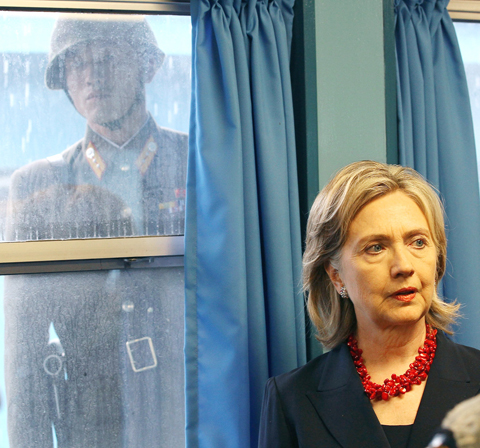Asia-Pacific foreign ministers struggled yesterday to formulate a response to escalating tensions on the Korean Peninsula as the US announced fresh sanctions against Pyongyang.
US Secretary of State Hillary Clinton declared the sanctions during a visit to Seoul ahead of the Asia-Pacific’s largest security dialogue in Hanoi, Vietnam, where the March sinking of a South Korean warship is a leading issue.
Diplomats from some of the 27 members in the ASEAN Regional Forum (ARF) — including North Korea and its main ally China — said there was disagreement over how far to go in commenting on the sinking of the warship in March.

PHOTO: AFP
However, there was general agreement that the six-party disarmament talks with North Korea should resume as soon as possible, and there were hopes the countries involved would hold informal discussions on the ARF’s sidelines.
“It’s a game of diplomatic brinkmanship,” an ASEAN diplomat told reporters.
Clinton and North Korean Foreign Minister Pak Ui-chun will attend the ARF meeting tomorrow alongside their counterparts from the disarmament talks — China, Japan, Russia and South Korea.
Pyongyang abandoned those talks last year but the ARF will place the top diplomats from those countries together in the same room for the first time since the warship sinking dramatically raised tensions on the peninsula.
“While there may not be a formal six-party talks at the sidelines of this conference it would be useful if we can help create conditions conducive for informal dialogue or informal communication to take place,” Indonesian Foreign Minister Marty Natalegawa said.
South Korean Foreign Minister Yu Myung-hwan wants some form of direct condemnation of the North to be included in the ARF’s final statement, and would oppose any declaration that includes Pyongyang’s denials.
A draft ARF declaration seen by AFP expresses “deep concern” over the sinking of the Cheonan with the loss of 46 lives.
It calls for a return to the six-party talks, but does not acknowledge an international probe which concluded that the warship was sunk by a torpedo from a North Korean submarine.
It also refers to a July 9 statement by the UN Security Council which condemned the sinking, but acknowledged Pyongyang’s denials and did not apportion responsibility — a result hailed as a “victory” by the North.
“We must be careful with any statement that would be seen to exacerbate those tensions,” the Asian diplomat said.
Noting that Pyongyang’s main backer China is a key player at the ARF, he added: “Some ARF members don’t want to push North Korea into a corner.”
Also See: Mullen critical of China limiting ties

MORE VISITORS: The Tourism Administration said that it is seeing positive prospects in its efforts to expand the tourism market in North America and Europe Taiwan has been ranked as the cheapest place in the world to travel to this year, based on a list recommended by NerdWallet. The San Francisco-based personal finance company said that Taiwan topped the list of 16 nations it chose for budget travelers because US tourists do not need visas and travelers can easily have a good meal for less than US$10. A bus ride in Taipei costs just under US$0.50, while subway rides start at US$0.60, the firm said, adding that public transportation in Taiwan is easy to navigate. The firm also called Taiwan a “food lover’s paradise,” citing inexpensive breakfast stalls

TRADE: A mandatory declaration of origin for manufactured goods bound for the US is to take effect on May 7 to block China from exploiting Taiwan’s trade channels All products manufactured in Taiwan and exported to the US must include a signed declaration of origin starting on May 7, the Bureau of Foreign Trade announced yesterday. US President Donald Trump on April 2 imposed a 32 percent tariff on imports from Taiwan, but one week later announced a 90-day pause on its implementation. However, a universal 10 percent tariff was immediately applied to most imports from around the world. On April 12, the Trump administration further exempted computers, smartphones and semiconductors from the new tariffs. In response, President William Lai’s (賴清德) administration has introduced a series of countermeasures to support affected

CROSS-STRAIT: The vast majority of Taiwanese support maintaining the ‘status quo,’ while concern is rising about Beijing’s influence operations More than eight out of 10 Taiwanese reject Beijing’s “one country, two systems” framework for cross-strait relations, according to a survey released by the Mainland Affairs Council (MAC) on Thursday. The MAC’s latest quarterly survey found that 84.4 percent of respondents opposed Beijing’s “one country, two systems” formula for handling cross-strait relations — a figure consistent with past polling. Over the past three years, opposition to the framework has remained high, ranging from a low of 83.6 percent in April 2023 to a peak of 89.6 percent in April last year. In the most recent poll, 82.5 percent also rejected China’s

PLUGGING HOLES: The amendments would bring the legislation in line with systems found in other countries such as Japan and the US, Legislator Chen Kuan-ting said Democratic Progressive Party (DPP) Legislator Chen Kuan-ting (陳冠廷) has proposed amending national security legislation amid a spate of espionage cases. Potential gaps in security vetting procedures for personnel with access to sensitive information prompted him to propose the amendments, which would introduce changes to Article 14 of the Classified National Security Information Protection Act (國家機密保護法), Chen said yesterday. The proposal, which aims to enhance interagency vetting procedures and reduce the risk of classified information leaks, would establish a comprehensive security clearance system in Taiwan, he said. The amendment would require character and loyalty checks for civil servants and intelligence personnel prior to